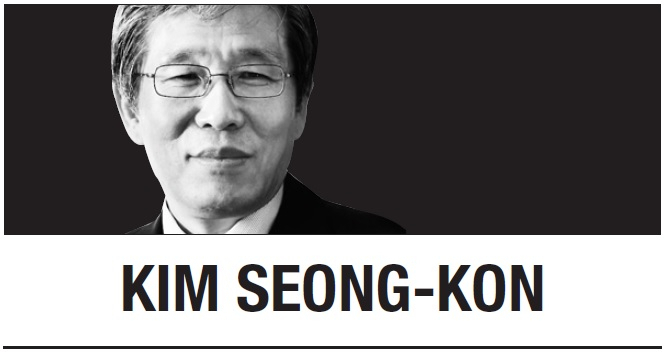
Almost two years have passed since Lee O-young, the great Korean thinker and eminent culture critic, sadly passed away. Last month, Minumsa published his last words in book form under the title, “Reading Lee O-young: Civilization, Culture, and Literature in the Era of Artificial Intelligence and Life Capitalism.” In that book, Lee left some invaluable wisdom and insights to his readers who felt lost in the whirlpool of today’s shallow social atmosphere full of fake news and grapevine rumors.
First, Lee warned that we should choose wisely between “strong winds” and “surging waves,” in other words, between the Continental Civilization and the Oceanic Civilization. If we choose wrongfully, he admonished, we might end up either “blown away by winds” or “washed away by waves.” Lee pointed out that geographically, the Korean Peninsula was located at the end of the continent and at the starting point of the sea. Shall we return to the past and dangle at the end of the continent as a weak and poor country again, or shall we move forward to the future and prosper as a powerful and affluent maritime country? He said the choice was ours.
According to Lee, the Donghak Revolution failed because it could not catch the rapid and radical transition from the Continental Civilization to the Oceanic Civilization. Moreover, the result of that upheaval was to invite Japanese troops to the Korean Peninsula, though unwittingly, expediting the Japanese occupation of Korea. Lee deplored that the Moon administration misguided the people by dragging them back to the dark, gloomy Donghak Revolution era of the 19th century.
Lee reminded us that we were now living in the era of AI and drones, not the Donghak Revolution. Indeed, AI is everywhere now and has changed our lives radically and rapidly. Lee, who was very good at electronic devices, said that AI would bring revolutionary change to our minds and society, for which we should be prepared.
Lee also mentioned that drones, too, have brought about a groundbreaking change to our lives by providing us with a bird’s-eye view. According to Lee, Greeks and Hebrews looked up to the sky and thought that all the good things were coming from high above, Olympus or heaven. Now, the times have changed and drones enable us to look down from the sky, providing us with almighty perspectives like the Olympian gods.
Lee also discussed his theory of “Life Capitalism.” According to him, industrial or financial capitalism has inevitably caused dehumanization, so we now should turn to “Life Capitalism.” That is to say, we should invest in our lives, just as we would invest our money in securities or bonds. Then, we could enjoy rich and fruitful lives.
While discussing Ruth Benedict’s “diaperology” theory, Lee also came up with his own “swaddlelogy” theory. He said that in parts of the West, parents customarily swaddle babies with cloths. If the swaddling was loose, the babies might develop a tender and positive personality. On the contrary, if the swaddling was too tight, the baby’s personality tended to be fastidious and negative, frequently saying “No!”
Another intriguing thing Lee pointed out in the book was the difference in the concept of law between the East and the West. In the East, for example, “Law” traditionally means “the Way” or “the right path.” Thus, “law” is something you are encouraged to do. If you abide by the law, you go to heaven. In the West, however, “Law” is about prohibition, something you should not break. If you go against the law, you go to jail.
Referring to Francis Bacon’s insight on bugs, Lee compared honeybees with butterflies, ants, and spiders. He pointed out that only honeybees could transform the sweet liquid they had collected from flowers into honey. As for butterflies, they just suck sweet nectar from flowers and fly away. For ants, there is nothing but labor all day long. Spiders wait indefinitely for insects to get caught in their web. Lee advises us that we, too, should be able to transform what we possess into something valuable and useful, just like the honeybees.
In the beginning of the book, Lee called for boundary crossing and a global mindset for Korean writers and intellectuals. To illustrate his thesis, Lee brought forth Choi Chi-won, a renowned 9th-century Korean scholar, who enlightened us by saying, “A man should not distinguish between his country and foreign countries” and “If we embrace each other, we can make everybody and everything come alive.” Lee would surely have lamented if he had seen the recent embarrassing scene in which one of our political leaders exhibited racial prejudice in front of a naturalized Korean public figure.
Lee O-young’s legacy opens our minds and eyes and guides us in the right direction amid the whirlwind of domestic and international conflicts we are now facing. Reading his last words, we miss the intellectual giant already.
Kim Seong-kon
Kim Seong-kon is a professor emeritus of English at Seoul National University and a visiting scholar at Dartmouth College. The views expressed here are his own. -- Ed.
-
Articles by Korea Herald



















![[Today’s K-pop] Treasure to publish magazine for debut anniversary](http://res.heraldm.com/phpwas/restmb_idxmake.php?idx=642&simg=/content/image/2024/07/26/20240726050551_0.jpg&u=)